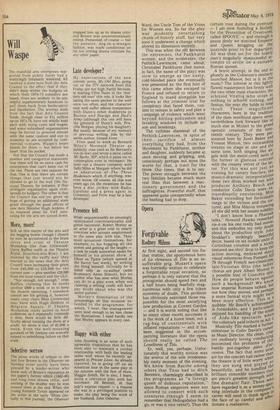Opera
Forgivable
Rodney Mihies
At first sight, and second too for that matter, the eponymous hero
of La clemenza di Tito is an in
sufferable prig. Mozart's opera was hurriedly written to celebrate a forgettable royal occasion, so perhaps it is only natural that the protagonist should spend two and
a half hours being fearfully magnanimous with only a few token moments of doubt. This problem has obviously exercised those responsible for the most satisfying new production at Covent Garden — and it is worth noting that like so many other recent successes it is the work of a home team, not a rag-bag of continentals with inflated reputations — and it has been suggested in the accompanying literature that the opera should really be called The Loneliness of Tito.
Er, well, yes, perhaps. Unfortunately this worthy notion was the source of the sole irredeemably nasty moment of the evening. We know from Racine among others that Titus had to ditch Berenice, charmingly described in the programme as "a foreign queen of dubious reputation," since Roman emperors were not allowed to consort with such creatures (though I seem to remember that Heliogabalus had a go, or was it vice versa?). Thus the curtain rose during the overture — I am now founding a Society
for the Protection of Overtures, called SPOOVE — and through a gauza dimly we watched Emperor and Queen snogging on the quayside prior to her departure. All was then set for the lonely man's singularly unsuccessful attempts to settle on a suitable Roman spouse.
A brave attempt, in the end as
ghastly as the Coliseum's similarly launched Manon, but is it in the music? The interest in this lightly flawed masterpiece lies firmly with the two other main characters, the schizoid Vitellia who stops at nothing to achieve nothing, and Sextus, the man she holds in total thrall. These magnificent characters, born in the tradition of the then moribund opera seria, nevertheless look forward like so much else in Mozart to the grand operatic creations of the nineteenth century. They were Per; sonated here by Janet Baker and Yvonne Minton, two outstanding mezzos on stage at one and the same time, both singing like angels with the metal-cored satin of the former in glorious contrast with the creamy velvet of the 1st" ter. Yet this was not just an evening for canary fanciers; the musico-dramatic interpretations these two divas worked out With producer Anthony Besch and conductor Colin Davis were extraordinarily convincing, MI55 -Baker extending her formidable range to the vicious and the tortured, and Miss Minton tempering all she did with her innate nobilitY. "I don't know how a Pharoah talks," Howard Hawks remarked and thisehmisboondeierseamllyy obbaldy do movulbei
about the production style. Jonr!
ful Stoddart's strikingly beauti, decor, based on six mobile units 01 Corinthian columns and a nicetextured see-thro' drop to keep the action moving, embraced nrill; visual references from PompenA 79 through French neo-classictsnl: late-Victorian ditto (the ladies chorus are pure Albert Moore) .te a possible hint of Cinecitta epIct. How do people behave agalhs„ such a background? We know, how imperial Romans talked, h P it' not how they moved, and ly a more formal style mighterith.ea; been more effective. This is quibble: Mr Besch's achievernell: is formidable, and I particularlYe enjoyed his handling of the scens of Aida-like spectacle Whe, the colonials paid tribute in Act Musically Tito marked a further milestone in Colin Davis's caree as Music Director. His clean, 0,1 yet endlessly loving conductIn. bmaisntiimiyisepdottthoegeptbroebr I epms ieceof dt,ho. casion. The fact that some aro' are forftobreathtreeciosnocrt
felithtlaellwroatrhr;r wthhae_non they are sung and played
beautifully, and he handled "I! brilliant ensemble numbers wt7ii' are piece's greatest strength ..6 fine dramatic flair. Those have regarded it as a money-51P;5 ning interlude in the comPos, erin career will need to think again c_ the face of so careful and affe tionate a realisation.


































 Previous page
Previous page